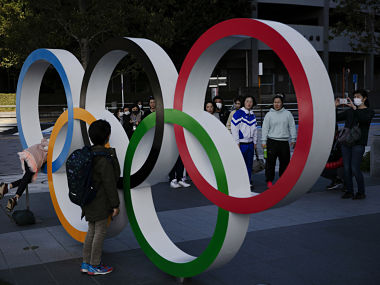Tokyo:
Japan's Olympic Minister Seiko Hashimoto suggested in Parliament this week that the Tokyo Games could be postponed by a few months from the planned 24 July opening and still meet a contract agreement with the International Olympic Committee. It’s not that clear cut and seems unlikely. [caption id=“attachment_8118121” align=“alignleft” width=“380”] People wait in line to take pictures with the Olympic rings near the New National Stadium in Tokyo. AP Photo[/caption]
The IOC has said repeatedly the Olympics will open as planned in just under five months despite a virus outbreak that started in China and has spread to at least 70 countries. More than 3,100 deaths have been reported including 12 in Japan, which has closed schools, called off mass gatherings, and cancelled several Olympic test events. Preseason baseball in being played in empty stadiums, the football J-League is suspended until at least till 18 March, and a major spring sumo tournament won’t allow fans. The 81-page “Home City Contract” signed in 2013 by the IOC, the city of Tokyo, and the Japanese Olympic Committee, gives the IOC wide latitude to terminate.
Reading from a prepared text on Tuesday, Hashimoto said : “The IOC has the right to cancel the games only if they are not held during 2020. This can be interpreted to mean the Games can be postponed as long as they are held during the calendar year.” Under a section titled “Termination,” the IOC has the right to terminate for many reasons; state of war, civil disorder, boycott, and others. It also says the IOC can terminate if it has “reasonable grounds to believe, in its sole discretion, that the safety of participants in the games would be seriously threatened or jeopardised for any reason whatsoever.” In the same section, it says the IOC can terminate if “the Games are not celebrated during the year 2020.” The contract says the IOC has to give local organisers, the city, and the national Olympic committee, 60 days notice to terminate. The section also says the city, local organisers, and the national Olympic committee “waive any claim and right to any form of indemnity, damages or other compensation." The modern Olympics have been cancelled only three times, all during wartime.
Acting as the No 1 cheerleader ,
IOC President Thomas Bach told athletes on Tuesday to remained focussed. “I would like to encourage all the athletes to continue their preparation for the Olympic Games Tokyo 2020 with great confidence and with full steam,” he said in Switzerland. Toshiro Muto, the CEO of the Tokyo Olympics, was expected later on Wednesday to announce crowd restrictions for the torch relay, which opens officially in Japan on 26 March in Fukushima prefecture, located 250 kilometers (150 miles) northeast of Tokyo. Any change to the 24 July opening would have to be approved by international broadcasters.
Tokyo is spending about $12.6 billion to organise the Olympics , although a national government audit says it’s twice that. The IOC gets 73 percent of its $5.7 billion income in a four-year Olympic cycle from selling broadcast rights. About half of that TV income is from
American network _NBC_ . NBC parent company Comcast said that because of insurance and the way contracts are written, NBC won’t suffer losses if the Olympics are cancelled. But Comcast CEO Brian Roberts said the company would miss out on ad-driven profits, which was $250 million for the 2016 Rio Olympics. He did not address the possibility of postponement of the Games during his remarks at an investment conference on Tuesday. The IOC says it’s relying heavily on the World Health Organization for advice. Dr Ali Khan, the dean of the College of Public Health at the University of Nebraska, in an email to AP said the virus outbreak “is a fluid and evolving situation, which makes predictions especially foolhardy. However, it is hard to imagine the outbreak will be fully resolved by the end of May.” Two former IOC vice presidents, Richard Pound of Canada and Kevan Gosper of Australia, have suggested
a decision about Tokyo must be made by late May . That would leave two months to line up more than 15,000 Olympic and Paralympic athletes, organise catering and television broadcasts — not to mention the fate of thousands of tourists, hotel reservations, flights, and ad campaigns. Tokyo has also suspended training until at least May for 80,000 unpaid volunteers. “From what we know from numerous other mass-gathering events including sporting events, it is very easy to spread diseases worldwide from such events from meningitis to Zika," Dr Khan said. “Besides welcoming athletes and spectators with their tiny microbes, there is and may be ongoing disease in Japan.”
Japan’s Olympic Minister Seiko Hashimoto suggested in Parliament this week that the Tokyo Games could be postponed by a few months from the planned 24 July opening and still meet a contract agreement with the International Olympic Committee. It’s not that clear cut and seems unlikely.
Advertisement
End of Article


)

)
)
)
)
)
)
)
)



